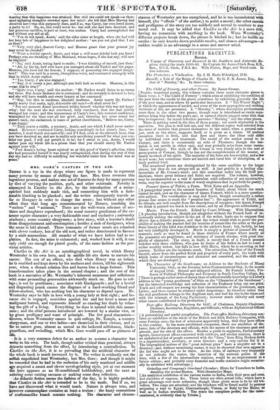MRS. GORE'S CASTLES IN THE AIR.
THERE is a toy in the shops where one figure is made to represent many persons by means of shifting the face. Mrs. Gore reverses this ingenious process, and makes one set of features do duty for many persons by dint of varying the position, garb, and other externals. Novelty is attempted in Castles on the Air, by the introduction of a mean- spirited lout suddenly made rich, and connecting him with a fash- ionable blackleg to be plucked ; and the writer subsequently travels as far as Hungary in order to change the scene ; but without any other effect than that long ago commemorated by Horace, touching the "ccelnm " and " =mum: There are the well-worn schemes of mo- thers and daughters reproduced; the usual country gentleman of the ex- treme squire character; a very fashionable roué and exclusive ; university students; some country clergymen; a love story, with a heroine's death -from disappointment and consumption ; besides a mob of foreigners, when the scene is laid abroad. These remnants of former meals are rehashed with clever cookery, but of the old sort, and rather deteriorated in flavour by a stale mannerism. All smacks of what we have before had to re- pletion. In fact, the mine is exhausted ; and, worked how it will, it can only yield ore enough for plated goods, of the same fashion as the pre- lions articles.
Castles in the Air is an autobiographical novel, in which Henry Wrottesley is his own hero, and in middle life sits down to narrate his career. The son of an officer, who died when Henry was an infant, he is snubbed and kept down by his mothers and sisters, till his eighteenth year, when a distant relation dies and leaves him a large fortune. This transformation takes place in the second chapter ; and the rest of the book is a narrative of Mr. Wrottesley's inherent meanness and selfishness with some pretending generosities awkwardly stuck on. He goes to col- lege' is cut by gentlemen ; associates with blackguards ; and by a brutal and disgusting prank causes the disgrace of a hard-working friend and fellow-student, who has nothing but his character to depend upon. Mr. Wrottesley says he falls in love with a young lady at first sight ; and be- cause she is engaged, nourishes against her and her lover a mean and malignant hatred, and represents himself as causing her death by refus- big the gift of a living. Everything he does is tainted with this mean- ness; and the chief persons introduced are lowered by a similar vice, or by gross profligacy and want of principle. The few good characters— 'Groves, whom Wrottesley causes to quit college, Dr. Temple, a country clergyman, and one or two ladies—are theatrical in their virtues, and so far as nature goes, almost as unreal as the lackered selfishness, black- guardism, and swindling, which Mrs. Gore would pass off as pictures of life.
It is a very common defect for an author to assume a character but write in his own. The fault, though rather critical than practical, always detracts something from the effect, by introducing a contradiction. In Castles in the Air, it is so pervading that the artificial character of the whole book is much increased by it. The writer is evidently not the selfish unpolished lout Wrottesley, but Mrs. Gore ; and though it might Be conceded that he had in the seclusion. of his early manhood and middle age acquired a smart and clever novel.grinding style, yet at one moment the hero appears as an ill-conditioned hobbledehoy, and the next as uttering some cutting sarcasm or making some deep reflection.
As didactic fiction seems the fashion of the day, it is highly probable that Castles in the Air is intended to be in the mode. But if so, we have not discovered what it would teach. Nature is always true, and Atowever commonplace contains at least a truism : the hasty concoctions of craftsmaulike knack contain nothing. The character and circum- stances of Wrottesley are too exceptional, and be is too inconsistent with himself, (for " effects " of the author,) to point a moral ; the other rascals and profligates of the story are too unlikely and unreal to conduce to any moral end. It may be added that Castles in the Air is a mere title, having no connexion with anything in the book. When Wrottesley's different projects break down, the phrase is hitched in ; but lie builds no castles : he only knocks down probable results, and abuses advantages—it sudden wealth is an advantage to a mean and narrow mind.


























 Previous page
Previous page